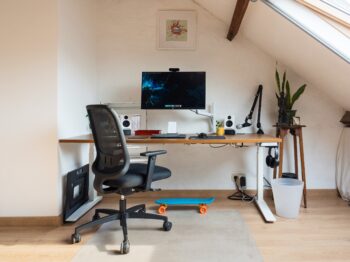How To Avoid Fatigue If You Sit At A Computer All Day

Working at the computer all day can affect our physical and mental health leading to fatigue.
Often those who spend long hours sitting in front of computers suffer from chronic back pain, neck strain, headaches, vision problems, carpal tunnel syndrome, and stress-related issues such as anxiety and depression—which all can be avoided with proper preventative care.
Let’s look at what you can do to avoid all of the above:
1. Combat eye strain with proper lighting
Having proper lighting is crucial in reducing eye strain.
Ensure the light behind your monitor is soft and even, so you can reduce most of the glare from the screen.
Placing a lamp at opposite sides angled towards the keyboard or desktop instead of the monitor will provide better balance and ease eye strain.
Additionally, consider investing in a pair of computer glasses since they are designed with eyestrain relief and can filter out some of the blue light emanating from screens.
Investing in glasses for computer blue light can help to reduce headaches and fatigue. With better lighting and computer glasses, you can easily combat eye strain.
2. Take regular breaks from your desk
Regular breaks from your desk can ensure your physical and mental health remains healthy and productive.
Setting a timer on your phone to remind you to step away from the computer every 45 minutes is a great way to recharge your energy and focus so you can continue working.
During these breaks, getting up and moving your body is essential. Take a short stroll around the house or office and take deep breaths of fresh air outdoors.
Focusing on distant views associated with green space can boost our attention spans and limit distractions, providing an effective break from being hunched over our keyboards all day.
Making proactive changes in how we work may be uncomfortable initially, but the rewards are worth it.
3. Use ergonomic furniture
Investing in an adjustable chair with the proper support for your back and arms is vital to feeling comfortable and productive working at the computer.
A keyboard designed for comfort (and easier typing) can help, too.
Mouse shape matters, too. Look for one that fits comfortably in your hand—it makes navigating through all the documents on the web much easier.
Ergonomic furniture is worth considering if you plan to spend extended periods working or studying at home, as it can significantly reduce fatigue, neck pain, and other physical discomforts.
4. Get up and move around
Modern work requires us to sit in front of computers or phones for much of the day.
However, it’s important to remember that we can’t remain glued to our chairs without feeling the effects.
Sitting for too long can weaken our muscles and compromise our circulation, leading to various medical issues, from fatigue and back pain to depression.
Get up and move around as often as possible to combat these negative consequences. You don’t have to break out into a full-blown yoga routine. Even just standing up during long calls or meetings or taking a short walk around the office can be enough to get your body going again.
Even a 10-minute walk around the block during lunchtime is better than nothing.
Even better – set a time to go for a walk, run, or bike ride for some fresh air.
Break up the workday with movement. Working from home means you might be spending a lot more time without moving your body, which can make you feel stiff or tense.
5. Stay hydrated
Keeping a bottle of water at your desk can help you stay hydrated throughout the day.
Replacing sugary drinks and caffeine with pure H2O can benefit both your short-term and long-term health and provide an additional energy boost when you’re feeling draggy.
Is drinking plain water enough? Consider adding lemon or lime slices to give it an extra zing without all the added sugar of traditional beverages — plus, get a dose of vitamin C.
6. Practice mindfulness meditation
Taking a few moments each day to be mindful can be incredibly beneficial for your physical and mental well-being. Mindfulness meditation helps us reconnect to the present moment, enabling us to pay attention to our thoughts, feelings, and bodily sensations without judgment or attachments.
By doing this, the body is encouraged to relax its muscles and blood vessels, which leads to a decrease in stress hormones like adrenaline and cortisol. This allows us to step back from chaotic days filled with endless obligations, responsibilities, and distractions—the little moments of peace can add up.
Summary
Working in a desk job can be both physically and mentally draining.
Taking actionable steps to ensure an effective and healthy work environment is vital to increased productivity when working at the computer.
By looking after yourself and making minor adjustments throughout the day, you can successfully manage time, beat stress levels, and improve overall wellness.



